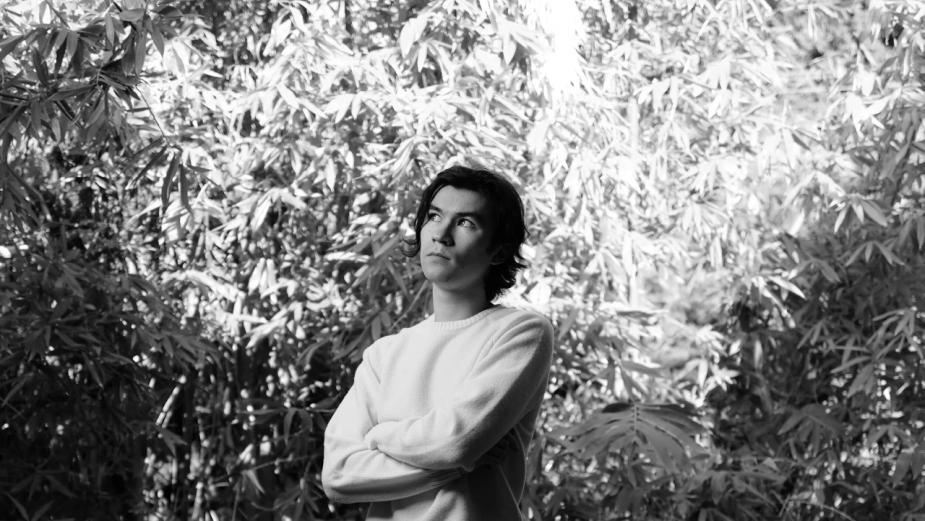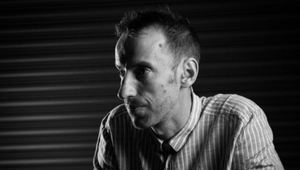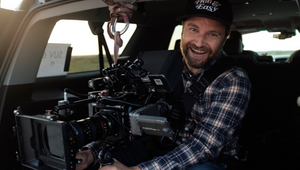
Why Specific Ideas Make the Most Interesting Ads with Lukas Dong

Now a director signed to Santa Monica's Porch House production company, Lukas Dong first fell in love with filmmaking by studying architecture and exploring how to bring the subtle details from his international childhood in Hong Kong, Tokyo, and New York City, to life. As his career developed, he grew to love design-oriented content and the stories of people who seek perfection at all costs.
On this journey, Lukas has directed films and interviews with artists, designers, and architects from around the world, from ABBA's Björn Ulvaeus to Roy Choi, Kengo Kuma and more. He's also directed narrative and documentary content for some of the world's leading brands, including a spot for a Cadillac and a recent Jaguar Land Rover x Condé Nast collaboration that captures California's breath-taking landscape, and the masterful designs of interior designer and ceramicist Jonathan Adler, who voices the project.
Speaking to LBB, Lukas discusses his creative process, why the work can suffer in the absence of limitations, and the wisdom in knowing when to fight for an idea or pivot.
LBB> What sort of scripts get you excited?
Lukas> Because ads are so short, I'm drawn to scripts that care about doing one thing really well, whether it's a touching moment with a hero, a standout location, or a compelling narrative through line. Commercial filmmaking moves so quickly and I’ve found I do my best work when I can really sink my teeth into something and create space on set for spontaneous moments to come to life.
LBB> How do you approach creating a treatment for a spot?
Lukas> Often times, there’s a lot of open-endedness at the start of a brief, usually along the lines of 'we want to see how you’d do it'. But an artist with no limitations suffers. So in search of some kind of North Star, I look closely for that one thing that resonates with me most in the initial concept or the brand, and use that as my sandbox. Sometimes its as simple as a quirky detail in the script, other times it requires a bit more searching - having a meal at the restaurant location in the script, or test driving the car that the ad is for.
It's not about falling in love with the brand, but finding something that clicks for me personally. No matter how irrelevant the detail may feel in the moment, I've learned that getting specific often leads to the most interesting ideas. I try to use that guiding light as I build my treatment and decide which ideas to fight for. The whole process is all-consuming, but I have grown so much as a creative from consistently ideating and figuring out how to communicate those ideas in the most efficient and elegant way possible.

LBB> What's the most important working relationship for you as a director?
Lukas> Other than a strong producer who literally makes everything come to life, I really value my relationship with the director of photography (DP). They are usually one step removed from discussions with the client and agency, so their perspective always feels very pure to me; they keep me in check as it can be easy to get distracted by all the noise and logistics flying around in my head. Great DPs also end up being a sounding board for me, for a lot of things, and I take care to work with great DPs that are strong storytellers themselves.
LBB> Which subjects, genres or styles are you most passionate about?
Lukas> My favourite films are about subjects I’ve never really cared about, which inspires me to believe that anything can be interesting when looked at through the right lens. If I were to find some connection, I am constantly inspired by thoughtful design. Not fancy things, but moments imbued with care and consideration. Collaborating with brands that put heart into their work and invest in the little details is very fulfilling for me, and I love the challenge of translating their intentions to the world.
LBB> Do you ever encounter any misconceptions about this process?
Lukas> The biggest misconception is that good design is just fancy bathrooms and jewellery. It can be the choreographed steps of two ballerinas moving in dialogue, the symphony that a sports car makes at 9,000 RPM, or the design of a bustling city street where building and sidewalk interacts seamlessly.
Above: Cadillac - 'Electric Nights Super Cruise'
LBB> What’s the craziest challenge you’ve faced on set? How did you solve it?
Lukas> It was a beautiful, sunny day in LA. Day one of two. A seemingly straightforward overnight shoot full of car-to-car running footage. It was a rare day where I didn’t know what to be concerned about… and there’s always something! First up, our primary location (a downtown LA street) should have been perfect, but a mix-up with the 'no parking' signs left it cluttered with cars - an unsightly obstacle for our car commercial shoot. Frantically, we scoured the area for an alternative, and by some stroke of luck, stumbled upon another stretch of road that could serve our needs.
We rallied the team and set out in our slow moving convoy of police officers, an arm car, two picture vehicles, and several more in tow. Just when we thought we'd overcome the first hurdle, a deafening 'POP' echoed from the camera car. The arm car’s suspension broke and it was out of commission. With 90% of our footage centred around running footage, this setback threatened to derail the entire shoot. Quick thinking led us to pivot to a makeshift solution, shooting what we could in a nearby parking lot while the camera car was replaced (in the middle of the night). We were finally ready to go. New car, everything worked. But upon arriving downtown, multiple police helicopters flew above us, ordering an evacuation due to an active crime scene. Luckily we got what we needed, but were kind of rattled by the situation.
Despite the chaos, we accomplished our day. It's funny how, when you think there's nothing left to worry about, the universe always finds a way to keep you on your toes.
LBB> Can it also be a challenge to protect your idea during the natural collaboration between agency, client and yourself?
Lukas> I learned early on that if you listen to everyone’s notes, you end up with something neither here nor there, and at the end of the day it’s on me if the end product doesn’t work, regardless of if I listened to every note. I’m there for a reason, and feel a responsibility to speak up and fight for the ideas that matter. That said, I understand that there are others who understand the brand and goals way better than I do, and I respect that. Knowing when to fight and when to pivot - I think it really comes down to the treatment. That’s why I work really hard to make sure I can fully visualise the finished piece before I start shooting. It’s where I find my North Star, it sets up my instincts and gut feelings for the rest of the project and is a roadmap everyone more or less agreed on. So I go off of those instincts.
LBB> Are you open to mentoring and apprenticeships on set? How can we open up the production world to a more diverse pool of talent?
Lukas> It’s definitely up to the people in the position to hire to help out new and diverse talent. I always make conscious decisions about who I work with and why, and will help and mentor others my whole life, just as I have been mentored. But a big part of my success has been the constant practice of my craft. I’ve put countless hours into filming, editing and directing, and I tend to surround myself with like-minded, craft-obsessed people, no matter where they are in their professional journey.
LBB> Do you incorporate much future-facing tech into your work?
Lukas> I have worked with a handful of 'new' technologies, virtual production stages, heavy CGI, etc. But the new technology that excites me are the tools that simplify the communication of an idea. I go through so many hoops across so many mediums to explain a concept, a scene, the lighting of a moment. I may use a photo paired with a song, paired with a dress to paint the picture. I’m excited for technology to make that more streamlined. I think no matter how advanced technologies get, filmmaking will always require some kind of communication skill. We don’t only work with lots of different people because we need hands, it’s also because filmmaking is a collection of perspectives.
Above: Google - 'Own It'
LBB> Which pieces of work do you feel really show off what you do best – and why?
Lukas> I think the [Chevrolet] Z06 piece is a classic. It feels like a stamp in time, both for the automotive world and my career. It was such an educational experience to work with such talented automotive filmmakers and learn from them. I also edited the 30-minute documentary pretty much alongside the production, cutting in the hotel overnight, and during pre-lights, and etc. It was rough, but I think that close workflow and the ability to test and tweak things in real time really let it take the shape it did and shine in its best light.
Secondly, I’m proud of the Google 'Own It' piece I directed. Most of my work before getting into commercials was documentary. And I think this piece really marries those two worlds. Real locations, real people, with a punchy 30-second anthem-esque script. It was quite hard, working at a fast pace, in small spaces, with non-actors, but a challenge I welcomed for a cause I support. And most importantly, I think everyone in the film felt proud to be a part of it.















